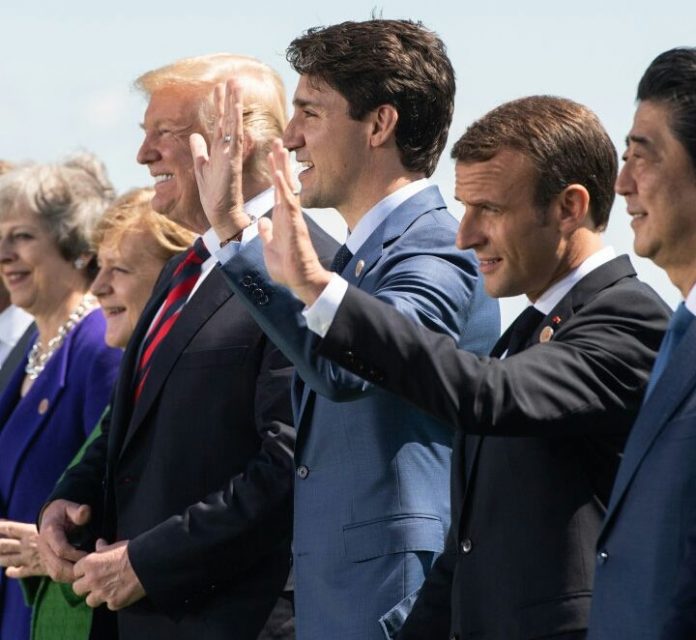As the heady summer months which have seen much geopolitical tension in the Persian Gulf draw to a close, global leaders descend upon the small southern French resort town of Biarritz this weekend for the annual G7 Summit. Primarily concerned with discussions surrounding international trade, climate issues and security, there is a renewed diplomatic flurry afoot, by two opposing factions of the same team. One such faction is led by the United States (US) and the United Kingdom (UK), whilst the other commanded by France, supported by Germany.
This diplomatic activity regards the work carried out first by the UK, and latterly the US, in building up support with like-minded partners for an international maritime force to ensure freedom of navigation for ships transiting the volatile Strait of Hormuz. Sailing precariously close to Iranian waters, the strait itself is used by Iran as a vulnerable choke point whereby Tehran have successfully used anti-access tactics in an attempt to leverage support for the failing Joint Comprehensive Plan of Action (JCPOA).
The biting US sanctions which President Trump reinstated last autumn after withdrawing from the JCPOA have destabilised the Iranian economy to such an extent that the IMF predicts that inflation could reach 37% this year (up from 9% in 2017), whilst GDP growth is expected to hit minus 6% (down from plus 12.3% in 2016).
This has caused Tehran to attempt to seek leverage from European signatories to the JCPOA; the UK, France and Germany. Whilst the UK government still supports the deal, in spite of Iran’s violations of the deal itself, London is moving increasingly towards the US’ position of ‘maximum pressure’ towards Iran. Ironically, the seizure of the British flagged Stena Impero facilitated this move closer to the US position, by British policy makers in the new Boris Johnson government.
By illegally seizing the Stena Impero from Omani waters last month, Iran showed a brazen willingness to defy the international rules-based order upon which the global economy depends. Whilst on average twenty British ships pass through the Strait of Hormuz each week, these waters are not only crucial to the UK’s national interests, but also to those of France, Germany, and indeed the rest of the European Union (EU).
So far, the UK and the US are leading the International Maritime Security Construct (IMSC), with Bahrain and Australia confirming additional assets to the task force. With diplomatic activity continuing by both London and Washington, it is hopeful additional allied nations will commit resources; in particular potentially from Poland and Japan, though yet to be confirmed.
Whilst the IMSC is being assembled and assets making their way to Bahrain, indeed, the US and the UK have already begun in earnest escort patrols for flagged tankers, European allies have thus far been blithe to commit either support or military personnel to the mission.
It is assessed that French President Emmanuel Macron will likely utilise the international platform of the imminent G7 Summit to galvanise support for a French-led EU observer mission to the Gulf. France and Germany have already expressed possible interest in such a mission, whilst outright refusing to support the existing US / UK-led IMSC.
In the short-term, this divergence in Western policy will only benefit Iran, as a weakened and split Anglo-European position will seek to cast further doubt on the US’ maximum pressure policy, causing some to question the legitimacy of such a policy in the face of European disapproval. In the long-term, this will benefit other such autocratic regimes who seek to undermine the global rules-based order, including Russian aggression in eastern Europe and Chinese expansionism in the South China Sea, amongst other regions.
European heads of state’s perceived power in Brussels is directly reflective of their domestic popularity and longevity. Whilst German Chancellor Angela Merkel has enjoyed a long reign at the top of the EU decision making elite, her tenure is ending. Despite a turbulent domestic period this year, Emmanuel Macron is fast becoming the new power broker in the EU, evidenced by the recent appointments in Brussels.
Donald Trump and Boris Johnson should seek to incorporate French support for the IMSC this weekend in Biarritz, despite German refusal and clear French reluctance. The US holds high levels of leverage over the French; Macron has long attempted to court the US President, and Washington is threatening to hit Paris with high tariffs on French wine imports. Going into the G7 Summit this weekend, the US holds the cards. This should be employed to seek European support for the IMSC, and not for an EU observer mission, whereby the divergence in Western policy toward Iran will only split further, emboldening autocratic states not just in the Gulf, but globally.
Image credit: G7 France
The views and opinions expressed in this article are those of the author and do not necessarily reflect the official policy or position of The Geopolitics.

Robert Clark is a postgraduate defence researcher at King’s College London. He has previously worked as a research assistant at the Henry Jackson Society, and has served in the British Army.


